Why experts recommend scalp sunscreens
Select independently determines what we cover and recommend. When you buy through our links, we may earn a commission. Learn more.
While you’ve probably heard that you need to lather up your face and body with sunscreen to protect your skin from the sun’s rays, you probably aren’t thinking about the top of your head. The scalp is a high risk area when it comes to sun exposure — and if damage like skin cancer is found on the scalp, it can be a tricky area to treat, says Dr. Claire Wolinsky, a board-certified dermatologist at Spring Street Dermatology in New York City.
“Studies have shown that hair provides very little protection for your scalp, regardless of hair color,” says board-certified dermatologist Dr. Michele Green. “If there’s no hair on the scalp, it’s extra important to protect it with sunscreen or a UV-protective hat.”
To help you narrow down the best scalp SPF for you, we consulted doctors about how to shop for scalp sunscreen and how to best protect your scalp from harmful UV rays.
SKIP AHEAD Best scalp sunscreen lotions, sprays and powders | What to look for in a scalp sunscreen | Which type of scalp sunscreen is best? | When to wear scalp sunscreen | How often should you check your scalp for sun damage?
Our top picks
Best lotion: Elta MD UV Restore Broad Spectrum SPF 40
Best spray: Sun Bum Scalp & Hair Mist SPF 30
Best powder: Supergoop Poof Part Powder
How we picked the best scalp sunscreens
When shopping for scalp sunscreens, our experts recommend you consider the following factors:
Type: There are two types of sunscreens, one being mineral and the other being chemical. Mineral sunscreens sit on the surface of your skin and reflect the UV light by using zinc oxide and titanium oxide as active ingredients. Chemical sunscreens absorb UV light with one or a combination of six chemical filters, according to our experts.
SPF Protection: In order to properly protect the skin, the sunscreen should have at least an SPF 30 rating, according to both our experts and the American Academy of Dermatology.
Formulation: Sunscreens come in different forms, including lotions, sprays, oils, powders and sticks. However, for the scalp, certain formulations work better than others depending on whether you have hair or not. For those with no hair, a sunscreen lotion would protect the scalp best, while a spray or powder might be better for those with hair, according to experts.
The best scalp sunscreens in 2023
Below, we compiled dermatologist-recommended scalp sunscreens as well as some highly rated ones to keep your scalp protected from UV rays. All of the products we list have a minimum SPF 30 rating in line with our experts’ guidance.
Best scalp sunscreen lotions
Elta MD UV Restore Broad Spectrum SPF 40
This sunscreen is great for both face and scalp coverage, and it has the added benefit of correcting sun damage, including sun spots, according to Dr. Jamie DeRosa, a double board-certified plastic and reconstructive surgeon. Not only does it protect the skin from UV rays, but it also has ingredients like squalane to restore moisture in the skin and antioxidants, including vitamins C and E, to help prevent free radical damage, too, DeRosa says.
Type: Mineral | SPF: 40 | Water resistance: None
Elta MD UV Restore Broad Spectrum SPF 40
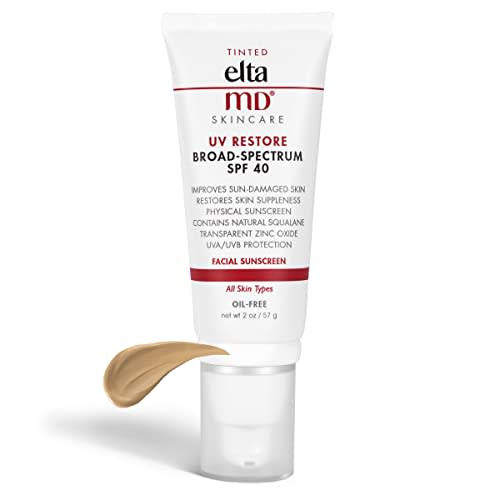
Elta MD UV Restore Broad Spectrum SPF 40 $ at Amazon
Elta MD UV Restore Broad Spectrum SPF 40 $ at Elta Md
Elta MD UV Restore Broad Spectrum SPF 40 $ at Dermstore
Neutrogena Sheer Zinc Face Mineral Sunscreen SPF 50
This Neutrogena sunscreen comes recommended by Dr. Eileen Deignan, a board-certified dermatologist and chief of dermatology at Emerson Hospital. The sunscreen has a hypoallergenic formula that’s suitable for all skin types, including sensitive skin, according to the brand. Apply the lightweight product on the scalp 15 minutes before exposing it to the sun. You should reapply the sunscreen after 80 minutes of swimming or sweating, or at least every two hours, according to the brand.
Type: Mineral | SPF: 50 | Water resistance: 80 minutes
Neutrogena Sheer Zinc Face Mineral Sunscreen SPF 50
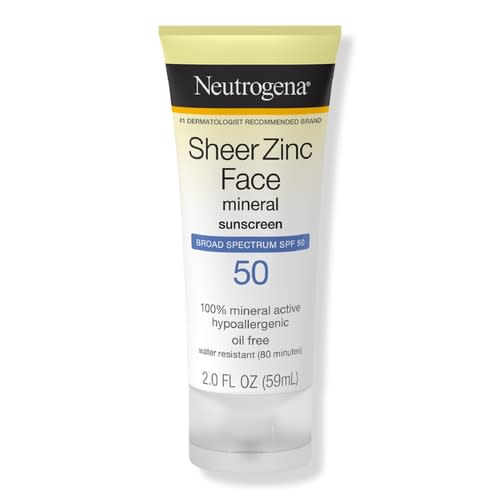
Neutrogena Sheer Zinc Face Mineral Sunscreen SPF 50 $ at Amazon
Neutrogena Sheer Zinc Face Mineral Sunscreen SPF 50 $ at Target
Neutrogena Sheer Zinc Face Mineral Sunscreen SPF 50 $ at CVS
Best scalp sunscreen sprays
Sun Bum Scalp & Hair Mist SPF 30
This spray sunscreen has a narrow nozzle at the top that makes it easy to apply the product on specific areas of the scalp, says Wolinksy. The broad-spectrum and water-resistant mist is suitable for all skin types because it’s noncomedogenic, meaning it won’t clog pores, and fragrance-free, according to the brand. The best way to apply this sunscreen is by spraying it 4-6 inches away from the scalp and evenly spreading out the product using your fingertips, according to Sun Bum.
Type: Chemical | SPF: 30 | Water resistance: 80 minutes
Sunscreen Scalp Spray SPF 30

Sunscreen Scalp Spray SPF 30 $ at Ulta
Sunscreen Scalp Spray SPF 30 $ at Target
Sunscreen Scalp Spray SPF 30 $ at CVS Pharmacy
Coola Scalp Spray & Hair Sunscreen Mist SPF 30
Coola’s scalp and hair spray has a non-greasy formula and SPF 30 that protects your scalp without weighing your hair down, according to the brand. With hair protection in mind, this sunscreen prevents UV-related hair color fading, moisturizes the hair and improves your overall scalp health with ingredients like monoi oil, panthenol and gotu kola extract, according to Coola. It has a 4.5-star average rating from over 3,100 reviews on Amazon.
Type: Chemical | SPF: 30 | Water resistance: 80 minutes
Coola Scalp Spray & Hair Sunscreen Mist SPF 30
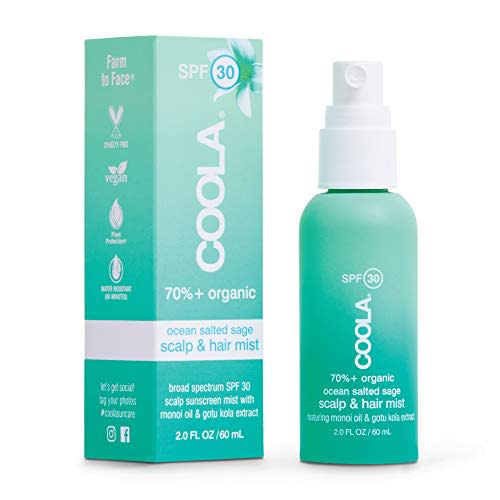
Coola Scalp Spray & Hair Sunscreen Mist SPF 30 $ at Amazon
Coola Scalp Spray & Hair Sunscreen Mist SPF 30 $ at Ulta
Coola Scalp Spray & Hair Sunscreen Mist SPF 30 $ at Sephora
Best scalp sunscreen powders
Supergoop Poof Part Powder SPF 35
If you’re looking to protect your scalp without making your hair greasy, you may prefer a powder formulation. This Supergoop Poof Part Powder comes recommended by both DeRosa and Green because it has silica to absorb excess oil on the scalp and vitamin C to protect the skin from damage caused by UV radiation. Apply the product two inches away from your scalp and blend it into your skin using a hairbrush or your fingertips, much like you would a dry shampoo, according to the brand.
Type: Mineral | SPF: 35 | Water resistance: None
Supergoop Poof Part Powder
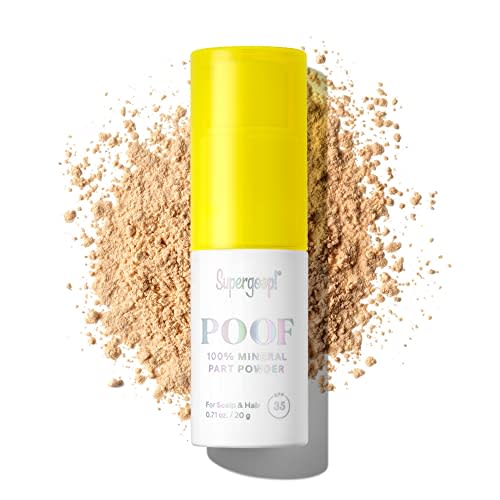
Supergoop Poof Part Powder $ at Amazon
Supergoop Poof Part Powder $ at Supergoop
Supergoop Poof Part Powder $ at BlueMercury
This face and scalp powder sunscreen is a favorite of Wolinsky because it’s easy to reapply. However, if you have thinning hair, consider using another sunscreen in conjunction with this powder since your scalp has more areas exposed than those with thicker hair, Wolinsky says. The brand recommends applying this sunscreen in a sweeping motion on your scalp.
Type: Mineral | SPF: 50 | Water resistance: None
Isdin Mineral Brush Sunscreen
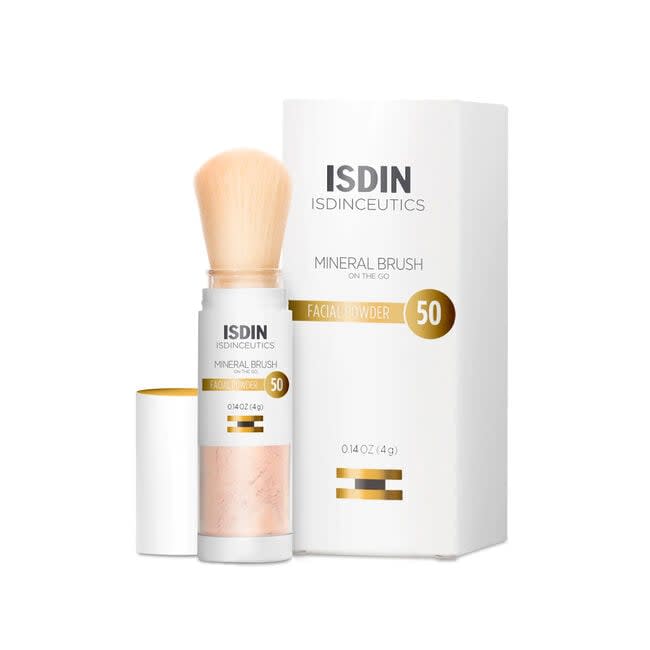
Isdin Mineral Brush Sunscreen $ at Amazon
Isdin Mineral Brush Sunscreen $ at Isdin
Isdin Mineral Brush Sunscreen $ at Skinstore
Colorescience Sunforgettable Total Protection Brush-On Shield Sunscreen SPF 50
If you’re worried about your sunscreen leaving a white cast on your hair and scalp, consider this tinted sunscreen powder, which has a 4.3-star average rating from over 4,100 reviews on Amazon and earned a spot in our guide to the best sunscreen for darker skin tones. Its broad-spectrum coverage can help protect against UV rays, infrared rays and high-energy visible light (blue light), according to experts. It’s available in four shades — fair, medium, tan and deep — and can be dusted over your part and head, or used to touch-up your face makeup throughout the day, according to the brand.
Type: Mineral | SPF: 50 | Water resistance: 80 minutes
Colorescience Sunforgettable Total Protection Brush-On Shield Sunscreen
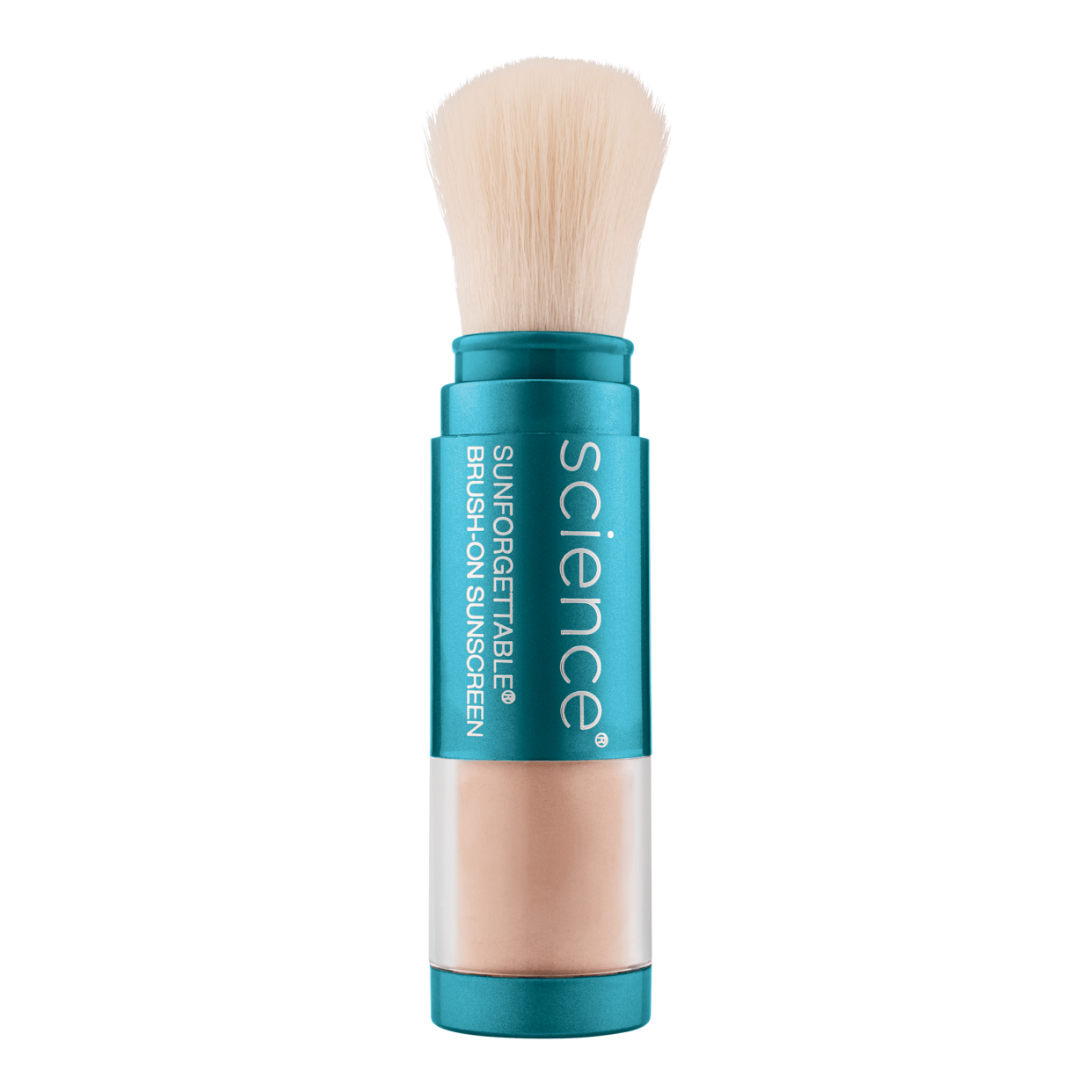
Colorescience Sunforgettable Total Protection Brush-On Shield Sunscreen $ at Amazon
Colorescience Sunforgettable Total Protection Brush-On Shield Sunscreen $ at Dermstore
Colorescience Sunforgettable Total Protection Brush-On Shield Sunscreen $ at Nordstrom
What to look for in a scalp sunscreen
When shopping for a scalp sunscreen, choose one that will block both UVA and UVB rays to maximize protection, according to our experts. Below, we list some other factors to consider when it comes to deciding which scalp sunscreen is best for you.
Mineral vs. chemical sunscreen
Choosing between a mineral or chemical sunscreen is based on personal preference, according to Wolinsky. Mineral sunscreens, also known as physical sunscreens, will have zinc oxide, titanium oxide or both as their active ingredients. These sunscreens are great for sensitive skin, but can leave a white cast on dark skin tones or on dark hair, depending on their formula, Wolinsky says. Chemical sunscreens have one (or a combination) of six chemical filters: oxybenzone, avobenzone, octisalate, octocrylene, homosalate and octinoxate.
Hair density
For some people, the scalp may be covered by hair, while others will have a completely exposed scalp. The density of your hair may impact which type of sunscreen you need.
If you have no hair covering the scalp, a cream or lotion sunscreen is the best option since it provides the most protection, and there is no worry about potentially making the hair greasy, according to experts.
If you have thinner hair, you may want to consider a spray since it’s the most comfortable and easiest to use, says Wolinsky. However, you can also apply a cream or lotion if it’s possible for you to access your scalp without getting your hair greasy, according to Wolinsky.
For those with long or thick hair, you may be a bit more limited on where you can apply sunscreen since a majority of the scalp will be covered. However, it’s important to apply sunscreen still if you have this hair density. Scalp sunscreen should be applied to any exposed areas, including where your part lines are.
Skin type
Factoring in your skin type will help you determine which scalp sunscreen will be the best option for you.
If you have oily and acne-prone skin, you may want to consider a lightweight formula if possible. The reason for this is so that you can avoid possible scalp breakouts, also known as folliculitis. Sensitive skin might want to avoid common irritants like fragrances, says Wolinsky. If you have sensitive skin, you should also consider a mineral sunscreen since chemical filters can be irritating, according to our experts.
Which type of scalp sunscreen is best?
There are three main scalp sunscreen formulations: lotions, sprays and powders. The type of sunscreen you choose is based on your personal preference.
“Lotion [sunscreens] are the most effective coverage, but they’re not practical to apply to a scalp mostly covered with hair,” Deignan says. If you do have hair, you can apply it to exposed areas of the scalp without making the hair greasy, says Wolinsky. You may want to opt for a sunscreen lotion if you’re going in the water because it’s thicker and stays on the scalp longer than spray or powder sunscreens, Green says.
Spray sunscreens are easy to use and reapply since they cover a larger surface area with one mist, Green says. They do need to be rubbed in, and it’s important to make sure you use a sufficient amount, according to Wolinsky. In terms of safety, you should close your eyes and hold your breath when applying spray sunscreens, Deignan says.
Powder sunscreens are the best to use if you’re worried about greasiness, especially if you have oily hair, according to experts. They absorb quickly, and they can also act as a dry shampoo, says Green.
Aside from the main formulations, stick sunscreens are another option to consider because they are easy to carry around and usually create less of a mess, but they do require at least four passes over an area to properly do their job, according to Wolinksy.
When to wear scalp sunscreen
You should wear scalp sunscreen no matter what the hair situation is like atop your head, according to experts. But it’s especially important if you don’t have hair or don’t have dark and thick hair, says DeRosa.
“Hair provides a certain amount of baseline sun protection — the proof is to look at the scalp under the hair,” Deignan says. “There are fewer freckles and the skin doesn’t display as many signs of sun exposure.”
If you have thicker hair or aren’t balding but still want to protect your scalp, you should focus your efforts on the edges of the hairline and your hair part, DeRosa says. Overall, cover your scalp with sunscreen where you can visibly see the exposed area to avoid sun damage. You can also layer on a physical blocker like a hat, according to our experts.
How often should you check your scalp for sun damage?
It can be hard to notice if your scalp has sun damage, especially if you have hair blocking your line of sight. If you see the same hairdresser regularly, be sure to ask them to point out anything unusual they might find, says Wolinksy. Your dermatologist should also perform a scalp exam in their yearly full-body examination, and if there is a history of skin cancer, they should be undergoing more frequent screenings, according to Wolinsky.
UPDATE (Feb. 1, 2023, 10:00 a.m. ET): A previous version of this article included Banana Boat Hair & Scalp Sunscreen Spray. Four lots of the product have become subject to voluntary recall for containing trace levels of the carcinogen benzene, which is not an ingredient in the sunscreen, according to the company. No adverse effects have been reported, no other batches are affected and the recall is “out of an abundance of caution,” Banana Boat said in a statement.
Meet our experts
At Select, we work with experts who have specialized knowledge and authority based on relevant training and/or experience. We also take steps to ensure all expert advice and recommendations are made independently and without undisclosed financial conflicts of interest.
Dr. Claire Wolinsky is a board-certified dermatologist at Spring Street Dermatology in New York City. Her areas of expertise include medical dermatology, including acne and rosacea, as well as cosmetic dermatology, such as lasers and injectables.
Dr. Michele Green is a board-certified cosmetic dermatologist at her own private practice in New York City. Her areas of expertise include skin cancer, skin disorders, non-surgical neck lifts, body contouring and more.
Dr. Eileen Deignan is a board-certified dermatologist and chief of dermatology at Emerson Hospital. Her area of expertise lies in medical dermatology.
Dr. Jaimie DeRosa is a double board-certified plastic and reconstructive surgeon and founder of the DeRosa Center Facial Plastic Surgery & Med Spa in Boston. She also is an assistant professor at Harvard Medical School and Boston University School of Medicine. Her area of expertise includes both surgical and nonsurgical treatments.
Why trust Select?
Justin Krajeski is a former associate editor for NBC Select. For this piece, Justin interviewed three dermatologists and highlighted their recommendations as well as other scalp sunscreens that are in line with their recommendations.
Bianca Alvarez is an associate reporter and has been covering beauty, including sunscreens, blackhead treatments and neck creams. For this piece, she interviewed a dermatologist and researched many scalp sunscreens that are in line with expert recommendations.
Catch up on Select's in-depth coverage of personal finance, tech and tools, wellness and more, and follow us on Facebook, Instagram and Twitter to stay up to date.
